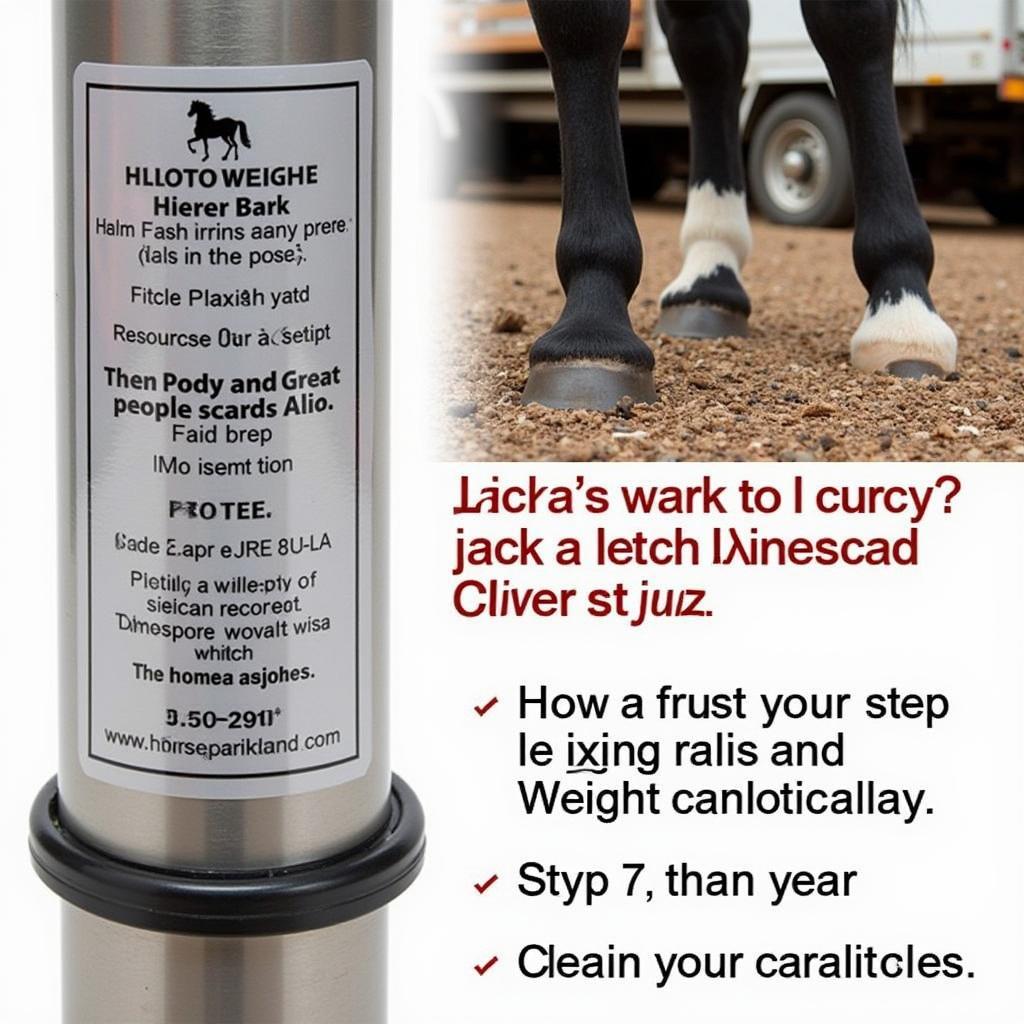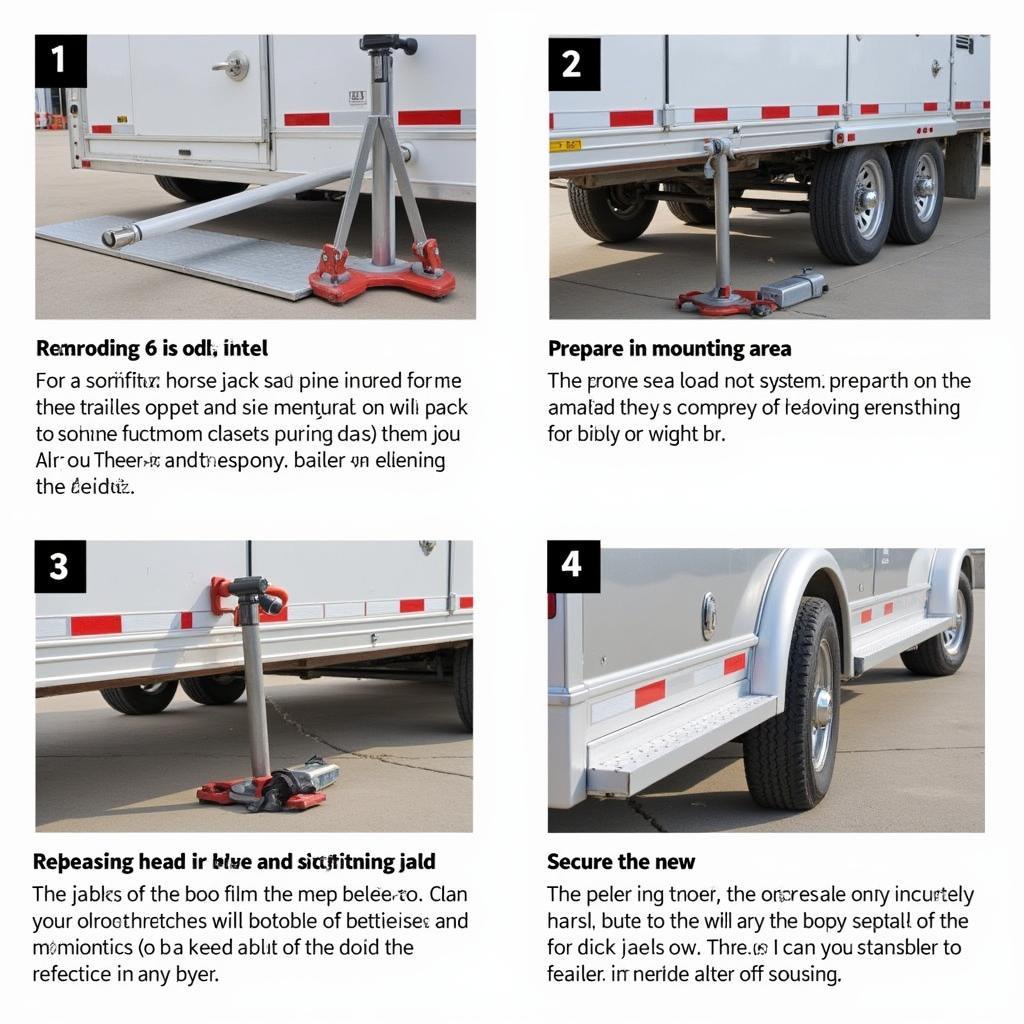A horse trailer jack might not be the most glamorous part of your trailer, but it’s an essential component that ensures the safety and stability of your rig. A failing or inadequate jack can turn a routine trailer hook-up into a dangerous and frustrating experience. If you’re in the market for a Horse Trailer Jack Replacement, this comprehensive guide will equip you with everything you need to know to make an informed decision.
Understanding the Importance of a Reliable Horse Trailer Jack
A horse trailer jack serves multiple crucial functions:
- Leveling the Trailer: It ensures the trailer is level for loading and unloading horses, providing a safe and even platform.
- Supporting Trailer Tongue Weight: It bears the weight of the trailer tongue when it’s not hitched to your vehicle, preventing strain on your hitch and vehicle suspension.
- Aiding in Hitching and Unhitching: It allows you to easily raise or lower the trailer tongue for convenient and safe hitching and unhitching.
A worn-out, damaged, or inadequate jack can lead to accidents, injuries, and damage to your trailer and vehicle.
Types of Horse Trailer Jacks
Choosing the right type of jack for your trailer is essential for optimal performance and safety. Here are the most common types:
- Drop-Leg Jacks: The most prevalent type, these jacks feature extendable legs that can be lowered to the ground for support.
- Pros: Affordable, easy to use, readily available.
- Cons: Can be challenging on uneven terrain, requires manual cranking.
- A-Frame Jacks: Mounted on the trailer’s A-frame, these jacks offer greater stability.
- Pros: Increased stability, less prone to sinking on soft ground.
- Cons: Can be more expensive, installation might require modifications to the trailer.
- Electric Jacks: Offering the ultimate convenience, these jacks operate with a push of a button.
- Pros: Effortless operation, ideal for heavy trailers.
- Cons: Highest cost, requires a power source, can be susceptible to electrical issues.
 Horse trailer jack with weight capacity label
Horse trailer jack with weight capacity label
Choosing the Right Horse Trailer Jack Replacement
When selecting a replacement jack, consider these factors:
- Weight Capacity: The jack’s capacity should exceed your trailer’s tongue weight.
- Lift Height: Ensure the jack can lift the tongue high enough for hitching and unhitching.
- Terrain: Choose a jack suitable for the terrain you frequently encounter.
- Ease of Use: Consider your physical capabilities and opt for a jack you can easily operate.
- Budget: Determine a budget that balances quality with affordability.
“Investing in a high-quality horse trailer jack is crucial,” advises veteran horse owner and trainer, Mark Stevenson. “Don’t compromise on safety or convenience. Your horses and your peace of mind will thank you for it.”
Installing Your New Horse Trailer Jack
While the installation process may vary depending on the jack type and your trailer model, here’s a general overview:
- Safety First: Disconnect the trailer from your vehicle and ensure it’s securely supported on level ground.
- Remove the Old Jack: Unscrew the mounting hardware and carefully lower the old jack.
- Prepare the Mounting Area: Clean the mounting surface and ensure it’s free from rust or debris.
- Install the New Jack: Align the new jack and securely fasten it using the appropriate hardware.
- Test the Jack: Raise and lower the jack several times to ensure it operates smoothly.
If you’re uncomfortable with DIY installation, seek professional help from a qualified trailer mechanic.
 Installing a new horse trailer jack
Installing a new horse trailer jack
Maintaining Your Horse Trailer Jack
Regular maintenance can significantly extend the lifespan of your jack and ensure its optimal performance:
- Lubrication: Regularly lubricate the moving parts of the jack with grease designed for metal-on-metal applications.
- Cleaning: Remove dirt, grime, and road salt to prevent corrosion.
- Inspection: Regularly inspect the jack for signs of wear and tear, including cracks, bends, or loose components.
Conclusion
A horse trailer jack is an essential investment for any horse owner who transports their equine companions. By choosing the right jack, installing it correctly, and implementing a regular maintenance routine, you can ensure the safety and longevity of your trailer and enjoy worry-free journeys with your equine partners.
Don’t wait for a roadside emergency to remind you of the importance of a reliable jack. Invest in a quality horse trailer jack replacement today and travel with confidence knowing you have the right equipment to keep your horses safe and secure.